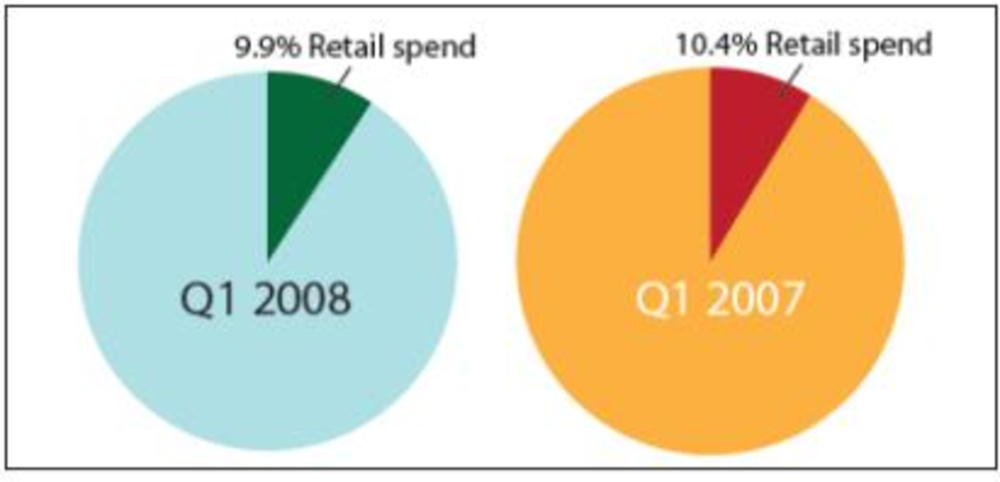The outlook for retailers’ 2009 direct marketing spend is uncertain, particularly in light of recent high-profile Wall Street woes such as the bankruptcy of financial services firm Lehman Brothers and the government bailout of insurer American International Group, which sent tremors throughout the economy last week.
In addition, many retailers are concerned about the upcoming holiday season. The gift-giving period may not provide its traditional boom to the commercial sector as consumers tighten their wallets, in response to the sluggish economy and rising prices, especially for fuel.
However, the catalog industry remains upbeat, despite this grim economic outlook.
In fact, the mood at last week’s New England Mail Order Association’s (NEMOA) fall conference in Burlington, VT, was relatively positive, as catalogers looked ahead.
A year ago, catalogers reeled from new postage rates that jumped as much as 40%. As a result, many conversations at NEMOA’s fall 2007 conference were far more gloomy than this year’s. And, that dark mood may have seemed prescient, as over the past 12 months, catalogers such as Lillian Vernon, Red Envelope and Sharper Image all filed for bankruptcy protection.
However, the consensus this year was that those catalogers which survived the past year are weathering the current economic situation, especially those with a niche focus that aren’t afraid to get out and market themselves.
“Taking bold steps in design and circulation can pay off handsomely,” said Carol Worthington-Levy, creative director and partner at Lenser, a consulting firm specializing in catalogs and e-commerce.
However, that optimism is not immediately reflected in ad spend forecasts.
Media services group ZenithOptimedia predicts that overall US ad spend will grow by merely 3.6% in 2008. This reflects the softening marketplace affecting traditional media, according to the company’s second quarter report.
The same report further projected a slight decrease in Internet spend growth to 23%, down from a forecast of 23.4% back in March. EMarketer has also twice revised down its forecasted Internet ad spend (see Optimized, p7).
The forecast for consumer magazines was also downgraded to 3% from a 5% estimate in March, primarily due to the economic conditions, and the report also predicted the slowing economy will allow digital media to continue to siphon advertising dollars away from print media.
“The softening economy and possible recession will increase the Internet’s share of spend, since online advertising is a low price buy, with large amounts of inventory, targeting capabilities and ads that can be quickly changed,” the report reads.
The June report further states that the consumer confidence index showed a fifth consecutive monthly decline in May to 57.2, down from 62.8 in April. And that was prior to the dire Wall Street news of the past two weeks.
Ron Bess, president and CEO of Euro RSCG Chicago and COO of Euro RSCG North America, said his advice to clients
is to be cautious, but not too cautious, with their 2009 ad spend.
“This is beyond what any of us have seen before, in terms of potential difficulty and dangers,” he said. “On the other hand, it can also be looked at as an opportunity to grow business with thoughtful marketing efforts and taking advantage of the opportunity to gain market share.”
Bess said retailers may approach this holiday season with trepidation.
“I think [over] the last couple of years the retail space has been somewhat cautious around the holidays, and that will be the case going into this year too,” he said.
One example is multichannel retailer Best Buy, which predicted a 1% to 3% store sales gain for fiscal year 2009.
However, the retailer also predicted that second half store sales gains will be slower than the first two quarters of this year “primarily due to macroeconomic headwinds and the cessation of government fiscal stimulus checks,” in its second quarter financial report.
One sector that may also be feeling a pinch from the slow economy is the technology sector. Computer retailer Dell predicted last week in its quarterly financial report that corporate spending on technology will slow.
Dell said decreased spending on information technology would lead to “further softening in global end-user demand.”
Direct marketing will likely follow these other industries, feeling a pinch from the softening and uncertain economy. However, experts say that companies will be able to weather the economic storm by being creative.
One way for direct marketers to prosper in a cooling economy is to expand to overseas markets, said Per Löfgren, director of EuroContactPool, a pan-European b-to-b database.
Even small and midsize companies can do this effectively, he added.
“You don’t necessarily have to be a large company to expand to overseas markets,” he said. “When the domestic market is in a downturn, direct marketing companies should to find new markets that are doing a little bit better.”
He said “the potential is always there” for American direct marketing companies to expand into the European Union, although it can be easier for some companies to do so depending on what services they offer.
“If you are selling Web services, it is a lot easier,” he said. “If you need a local sales force employed in each country, then it becomes a much bigger step.”
One way for smaller direct marketing companies to break into an overseas market is to use local database companies in those countries that have knowledge of the local market, he noted.








